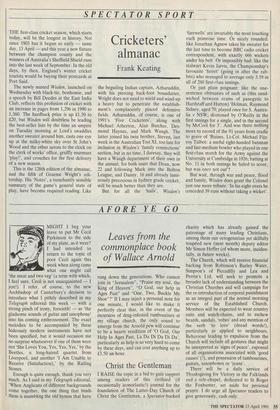SPECTATOR SPORT
Cricketers' almanac
Frank Keating
THE first-class cricket season, which starts today, will be the longest in history. Not since 1903 has it begun so early — same day, 13 April — and this year a new fixture between the champion county and the winners of Australia's Sheffield Shield runs into the last week of September. In the old days, by then, England's winter cricket tourists would be buying their postcards at Port Said.
The newly minted Wisden, launched on Wednesday with black-tie, bonhomie, and a speech by Bill Deedes at the East India Club, reflects this profusion of cricket with an increase in pages from 1,296 in 1990 to 1,360. The hardback price is up £1.50 to £20, but Wisden will doubtless be leading the best-seller lists by the time an umpire on Tuesday morning at Lord's swaddles another sweater around him, casts one eye up at the milky-white sky over St John's Wood and the other across to the clock on the clerk of works' office, gruffly murmurs `play!', and crouches for the first delivery of a new season.
This is the 128th edition of the almanac, and the fifth of Graeme Wright's edi- torship. His 'Notes', a trenchantly sensible summary of the game's general state of play, have become required reading. Like the beguiling Indian captain, Azharuddin, with his piercing back-foot boundaries, Wright does not need to wield and wind-up a heavy bat to penetrate the establish- ment's complacently placed defensive fields. Azharuddin, of course, is one of 1991's 'Five Cricketers', along with Michael Atherton, Alan Butcher, Des- mond Haynes, and Mark Waugh. The latter joined his twin brother, Steven, last week in the Australian Test XI, too late for inclusion in Wisden's 'family connections' section, but in no time, I daresay, they will have a Waugh department of their own in the annual, for both insist that Dean, now 22 and following Mark into the Bolton League, and Danny, 16 and already lumi- nously precocious in Sydney grade cricket, will be much better than they are.
But for all the 'hails', Wisden's `farewells' are invariably the most touching each primrose time. Or nicely rounded: like Jonathan Agnew takes his sweater for the last time to become BBC radio cricket correspondent, with exactly 666 wickets under his belt. Or impossibly bad: like the stalwart Kevin Jarvis, the Championship's favourite 'ferret' (going in after the rab- bits) who managed to average only 3.59 in all of 260 first-class innings.
Or just plain poignant: like the one- sentence obituaries of such as (this sand- wiched between reams of panegyric to Hardstaff and Hutton) 'Holman, Raymond Sidney, aged 70; played once for S. Austra- lia v NSW; dismissed by O'Reilly in the first innings for a single, and in the second by McCool for 3'. And was there nothing more to record of the 91 years from cradle to grave of 'Baines, Lt-Col. Michael Fitz- roy Talbot: a useful right-handed batsman and fast-medium bowler who played in one first-class match for the Army against the University at Cambridge in 1926; batting at No. 11 in both innings he failed to score, but was once not out'?
But wait, through war and peace, flood and family, Wisden does grant the Colonel just one more tribute: 'In his eight overs he conceded 39 runs without taking a wicket'.


























































 Previous page
Previous page